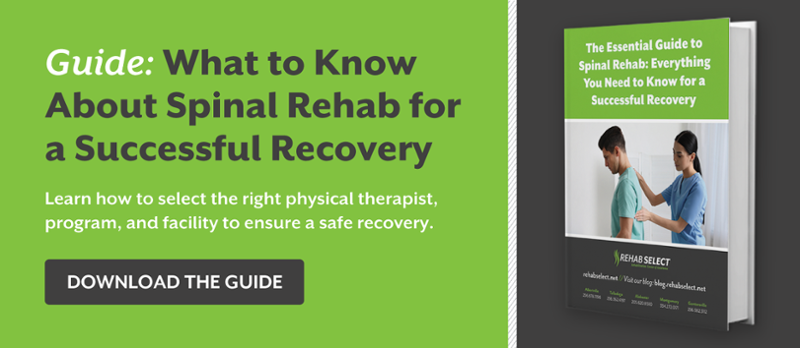
If you need spinal surgery, you're not alone. As many as 450,000 people in the United States have spinal cord injuries (SCIs) that impact the spinal cord's ability to transmit signals from the brain to the body's various systems. SCIs may affect a patient's sensory, motor, and autonomic functions. Spinal surgery is a common treatment to help them relieve pain and regain mobility.
There are many different types of spinal surgery. Some are used to treat injuries caused by acute, life-threatening accidents (e.g., in the neurosurgery category,) while others are elective, orthopedic procedures.
Regardless of the nature of the surgery and the reason for having the operation, spinal surgery is an extensive medical procedure that requires proper planning before and after the hospital stay. Here are some key facts you should know if you or a loved one has spinal surgery questions.
6 Common Types of Spinal Surgery
There are many different types of spinal surgery. Here's what they entail:
- Spinal fusion: This procedure targets chronic nonspecific back pain accompanied by degenerative changes. It joins vertebrae to limit motion while preserving the range of activities.
- Laminectomy: A common treatment for lumbar spinal stenosis, this procedure removes parts of the bone, bone spurs, or ligaments in your back to relieve the pressure on the spinal nerves.
- Foraminotomy: This procedure helps eliminate pain caused by compressed nerves. Your surgeon will cut away bone at the sides of the vertebrae to relieve pressure and ease the pain.
- Diskectomy: Your surgeon will remove all or part of a disk that has slipped out of place, causing back pain. A microdiscectomy involves using an operating microscope to make a smaller incision.
- Disk replacement: This surgery involves removing damaged disks and inserting an artificial one between the vertebrae.
- Interlaminar implant: This is a minimally invasive alternative to laminectomy. It implants a U-shaped device between two vertebrae in the lower back to ease the pressure on the spinal nerves.
Spinal Surgery Risks You Should Know
Like all surgical procedures, spinal surgery may cause complications. While many of these issues occur immediately after surgery, some may emerge months after the operation. Here are the spinal surgery risks you should be aware of:
- Anesthesia complications: These are often due to adverse reactions to drugs or other medical conditions.
- Thrombophlebitis: Blood clots may stop normal blood flow to the lung or even cause a pulmonary embolism.
- Lung problems: Anesthesia medication, pain killers, and prolonged bed rest may impact lung functions. But with proper rehab and exercise routine post-surgery, you can regain them gradually.
- Infections: These may occur at the skin incision or spread deeper into the areas around the spinal cord and vertebrae.
- Persistent pain: Chronic pain that doesn't improve over time may require further medical intervention.
- Hardware fracture: The metal screws, plates, and rods that keep the vertebrae in place during the healing process could break or move from the correct position.
- Implant migration: This refers to the implant (e.g., disc) moving before healing is complete.
- Pseudoarthrosis: This occurs when a fractured bone or an attempted fusion doesn't heal properly, leading to chronic pain.
- Nerve damage: Side effects may include weakness, paralysis, pain, sexual dysfunction, or loss of bowel or bladder control.
Spinal Surgery Questions to Ask Your Surgeon
To improve your treatment outcomes, take the time to understand the procedure, prepare before the surgery, understand spinal surgery costs, and have the right resources to support your recovery. Here are just a few of the essential spinal surgery questions you should ask your healthcare provider:
- Is this type of spinal surgery recommended for my condition?
- What are the potential risks, complications, and side effects?
- Is there a lower-risk alternative?
- What kind of results can I expect from the procedure?
- Will my condition worsen without the surgery?
- What's the spinal surgery cost involved?
- How should I prepare for the operation?
- What will the surgery and the hospital stay look like?
- Can I go home after the hospital stay, or should I go to a rehabilitation facility?
- When can I return to work after the surgery?
- What is the typical healing process and timeline?
- Will I need professional wound care or pain management?
- What can I do to regain my strength after recovery?
- Do I need a rehabilitation program or physical therapy?
- What rehabilitation program is appropriate for my condition?
Achieve Optimal Recovery from Your Spinal Surgery with the Right Rehab Program
Spinal injury is a serious condition. Recovery from surgery is a journey that involves long-term hospitalization and a comprehensive rehabilitation plan at a trusted facility.
Physical therapy is a critical part of most rehabilitation processes to reduce spinal surgery risks. Specialists will work with you to prevent muscle wasting and contractures while retraining muscles to improve mobility, build strength, and regain range of movement.
Orthopedic rehab is particularly helpful in aiding recovery from cervical and lumbar spine cord injuries and surgery. It can help minimize muscle complications, shorten the time to recovery, reduce the risk of depression, regain lung functions, and improve treatment outcomes and quality of life.
Rehab Select provides inpatient orthopedic rehab programs for patients recovering from spinal surgery in Alabama. Our treatments help patients recover from injuries affecting the muscles, bones, and joints—including spinal column and spinal cord injuries.
Our programs combine multiple modalities, such as extensive physical therapy, occupational therapy, and counseling for emotional support, into an integrated, customized treatment plan based on each patient's unique condition to facilitate healing.
The combination of exercises, manual therapies, wound care, professional pain control, electrical stimulation of the spinal nerves, and assistive devices can help you accelerate recovery and adapt to your new physical conditions.
Our post-surgical rehabilitation programs help patients pave the way to faster recovery and better treatment outcomes. Schedule a tour if you're planning a spinal surgery in Alabama.





